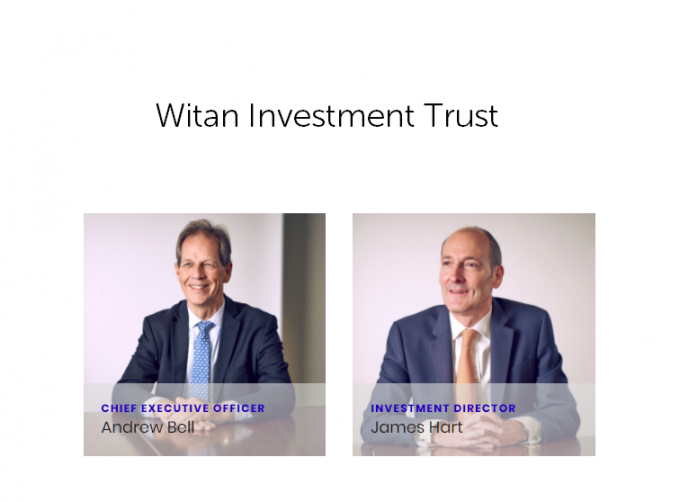Witan has better second half – After lagging its benchmark by 12.6% over the six months ended 30 June 2020, over the rest of the year it managed to claw some of this back. For 2020 as a whole, Witan returned 4.2% versus a 9.5% return for its benchmark. The dividend for the year increased by 1.9% to 5.45 pence per share (2019: 5.35 pence), using £19m of its £71m revenue reserves to achieve this. this helps maintain a record of 46 years of consecutive dividend increases.
Much of the problem arose when it adopted a new benchmark with much greater exposure to the US and then failed to follow that up by increasing its exposure to the country.
Extracts from the CEO’s report
In terms of the manager line-up, Andrew Bell had this to say “During 2020, contracts with four of the ten external managers in place at the start of the year were terminated. Three (two investing in Europe and one in the UK market) reflected the change to a simplified and more global asset allocation from the start of 2020. The fourth (a global value manager) reflected our assessment of the accelerated economic changes in the wake of the pandemic, which were felt to be more favourable to adaptable, quality and growth investment styles and less supportive of systematic cyclical or mean reversion approaches. We appointed two new global managers in August: Jennison, seeking out companies with exceptional growth prospects, and WCM, with a focus on high-quality companies with strong culture and increasing competitive advantages. They were funded with smaller allocations initially, to which we have gradually added, as relative valuations between growth stocks and the rest of the market were at an historic extreme during the summer.
Two small externally managed portfolios were increased during the year. We added £15m to the Latitude global portfolio at the start of April. The portfolio (2.6% of assets at the year-end) subsequently recovered strongly in absolute terms, albeit lagging the global index benchmark. We added a total of £25m to the GMO Climate Change Fund holding in April and June, taking advantage of the setback to its renewable energy and other holdings as an indirect effect of the fall in oil prices. The fund with 3% of assets at the year-end delivered a return of over 37% during 2020, well ahead of the 13% benchmark return.”
In terms of performance: “In 2020, four of the six principal third-party managers in place for the full year outperformed their benchmarks, as did the directly managed portfolio of investment companies.
A particularly strong relative performance was achieved by Artemis, our remaining specialist UK manager, whose +0.2% portfolio return was well ahead of the fall of 12% in the MSCI UK IMI Index. This followed the strong recovery they had enjoyed in 2019 after several years of underperformance. Veritas (+11%) and Lindsell Train (+13.3%) were, respectively, slightly behind and slightly ahead of their benchmark at the year end, having outperformed in the turbulent first half. Matthews’ 26% return in Asia was 10% ahead of the regional benchmark, while GQG Partners’ 32% return was over double the return on the emerging markets benchmark. Lansdowne’s 0.2% total return was well adrift of the 13% global index return owing to exposure to the underperforming UK market and to sectors, such as airlines, that were badly hit by the pandemic. However, their portfolio significantly outperformed in the second half, recovering from a 22% loss at the end of June. Jennison and WCM both outperformed in the short period since they were appointed.”
Within the directly managed portfolio, “At the year end, half the portfolio was in listed private equity vehicles. The largest holding, Apax Global Alpha had a 2020 total return of 19%, from a portfolio of growth companies, concentrated in the technology and healthcare sectors. Princess Private Equity‘s price fell in the early stages of the pandemic, as it suspended its dividend while it assessed the funding needs of its portfolio. We doubled our holding and the price subsequently rebounded, as the net asset value recovered, and the dividend was reinstated. Electra Private Equity, a smaller holding, suffered from the concentration of its portfolio in two UK companies exposed to the recurrent pandemic shutdowns. Better news on the portfolio enabled the share to double from its lows but it still fell sharply during the year. The second largest portfolio holding is Syncona, a company specialising in founding and funding innovative life science companies. The shares performed strongly, rising 19% during the year. For a number of years, we have had a holding in the BlackRock World Mining Trust, which gives Witan additional exposure to the commodity mining sector. Demand was strong in 2020, due (among other factors) to growth in China and the expansion of demand for copper due to growth in electrification. The shares’ total return (having been down 40% in March) was +47% at the year end and we took the opportunity to trim our exposure. The other material holding is in the Schroder Real Estate Investment Trust, a company investing in UK commercial property. Although the net asset value return was fairly resilient (down 5%) sentiment was adversely impacted by a reduction in its dividend, concerns over Brexit and the impact on the sector of increased working from home and trading restrictions in the restaurant and retail sectors. As a result, despite relatively low exposure to the London office and retail segments, the discount to NAV widened and the share price total return was -26%.” [Good to see Apax Global Alpha get a prominent positive mention – have you read our note?]
WTAN : Witan has better second half
